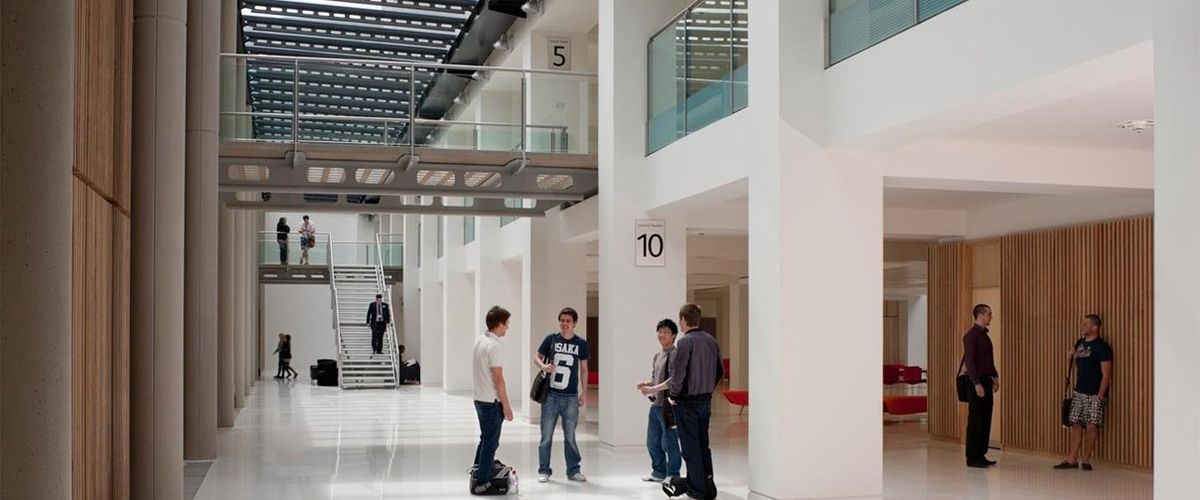
Nottingham Trent University transforms IT process with Zendesk CX
Nottingham Trent University implemented Zendesk in two months to serve over 26,000 students, providing a much-needed CX transformation. Centralizing communication and adding mobile apps helped turn IT services from an ineffective call center to an efficient support organization, boasting up to 100% CSAT scores.

“The board of governors believe the university’s information systems have been transformed with Zendesk Support—and they are right."
Director of Information Systems - Nottingham Trent University
“While it’s hard to calculate direct savings with the same number of people, we are doing much more, far quicker. Proof it works is in the satisfaction levels.”
Director of Information Systems - Nottingham Trent University
Industry:
Higher Education
Headquarters:
Nottingham, UK
Size:
2,500
CSAT:
96%
26,000
Students
2,100
Tickets/week
257
Agents
96%
CSAT
When Mike Day arrived as Director of Information Systems at Nottingham Trent University (NTU) in autumn 2011, there was a problem with support.
“It was obvious because the team couldn’t tell me what the problems were and a ‘new’ service desk was taking such a long time to implement that people were giving up.”
Finding the best fit for support
Day came across Zendesk Support while working at another university, but was not keen to assume it would be the best solution, “We wanted the solution that was right for Nottingham Trent, so we evaluated a number of options. In the end, Zendesk Support was the obvious choice because it is so easy to set up, the reporting is excellent, and enables us to measure and manage a massive change!”
They implemented Support in just two months. The simplicity of the solution is the key, said Day. “It’s flexible and responsive. No process or bureaucracy delays.” And the implementation was easy. “Some staff asked for training, and we said ‘give it a go see if you need it’,” Day said. “No one needed it! Zendesk Support is absolutely ideal, as the staff focuses on first rate service and the technology is way ahead!”
Mobile app powering expanded service offerings
Nottingham Trent’s IT department alone receives around 300 tickets a day—from ‘how do I get this projector working?’ to detailed questions around software functionality. With 26,000 students and 2,500 staff, FAQs and forums are very important. “Our FAQs cover all sorts of topics from getting the most from an iPad to staying internet safe—we expect to encourage more and more self-service where it’s appropriate.”
Mobile apps enable agents to solve issues from anywhere, “They are encouraged to be out and about because it is more efficient. Mobility also means incredibly good business continuity because support isn’t reliant on a specific building or particular device. IT services was seen as some remote, ineffective call-center before, but now we are seen as colleagues, and we get credit for doing things!”

Following the success within IT, the university gradually added Library Services, Student Services, Estate Management and the Digital Marketing team and now have 257 agents across the university. Student Services helps with everything from accommodation to loans, Digital Marketing supports people who need to contribute to the university website, and Estates covers all kinds of issues, from air conditioning to security.
“We now have a way to record, manage, and close all these requests. Zendesk Support simplifies communications and tracking and definitely increases efficiency—we have a clear view of what needs to be done, and can see if it has been done.”
Cross-departmental, streamlined support
With Support in place across the departments, students and staff go to a ‘one stop shop’ with their queries, “It’s the rules and agent expertise that ensure they are handed to the correct department. A previous separation of support roles, such as Library Services for this, IT for that, created a disconnect and caused some things to fall through the gaps. Zendesk Support is now the common solution across all departments, all things are covered, there is a clear history and, crucially, a formal hand-off when a job is complete,” said Day.
Day cited this new collaboration, communication, and understanding between internal departments as the biggest win. “Zendesk Support has given us incredible understanding because it has brought teams together, giving everyone an insight of pressure points across the university.”

Dissertation deadlines are prime example. “IT runs a student print shop. In the run up to deadline day people literally lined up down the road, not just because it got busy but many students who came to print needed significant formatting support before work could be printed, causing huge delays in the queue and lots of unhappy students,” Day explained. “So IT collaborated with Library Services, providing extra student support before the hand-in date and lending library staff to the print shop. The changes meant most students had their formatting already done, on-site library staff assisted the odd ones remaining, the lines were reduced, and customer satisfaction was at 92 percent.”
Day said that this kind of collaboration wasn’t happening and wasn’t possible before Support. “We’re taking it further,” Day went on, “by working with the academic community to stagger hand-in dates, deliver more information at student inductions. There is also powerful collaboration with students, and the integration with social media means they raise jobs for us via Facebook and Twitter, where they feel most comfortable. Students are starting to help each other out—pitching in with answers—because of the open forum format.”
Anticipating the future
In the future, Day expects that Support will be used even more widely. “We can certainly fill other pockets, possibly extend it to external educational establishments we work with regularly. “He plans to take advantage of the social integrations to build collaboration and peer support, “and we will continue to tweak our satisfaction measures, making sure any remaining hot potatoes are dealt with as quickly as possible.”
The department keeps an eye on response times, but, said Day, “the real measure of our success is how satisfied people are. Our satisfaction rate is incredible. At the end of a task everyone is asked to rate the service, and amazingly around 40% do. The satisfaction figures from the last 100 jobs are then used to calculate customer satisfaction, so we are always monitoring the latest sentiment.”

Day in, day out the satisfaction rate comes in at between 96 and 100 percent. Other departments newer to Support are just building stats, but Day said “broad awareness indicates they are all pretty high. Plus we can pinpoint the small remaining areas of low satisfaction, and concentrate on the dissatisfied few. Before Zendesk Support we were just fighting technology rather than gaining insight.”
Day couldn’t measure satisfaction before Support, as the old system was too cumbersome to configure. It was also very expensive. “We pay less for Zendesk Support now than the basic maintenance of our old system,” Day said, “and the follow-on savings are even more valuable.” While it’s hard to calculate direct savings, he added that, “with the same number of people, we are doing much more, far quicker. Proof it works is in the satisfaction levels.”